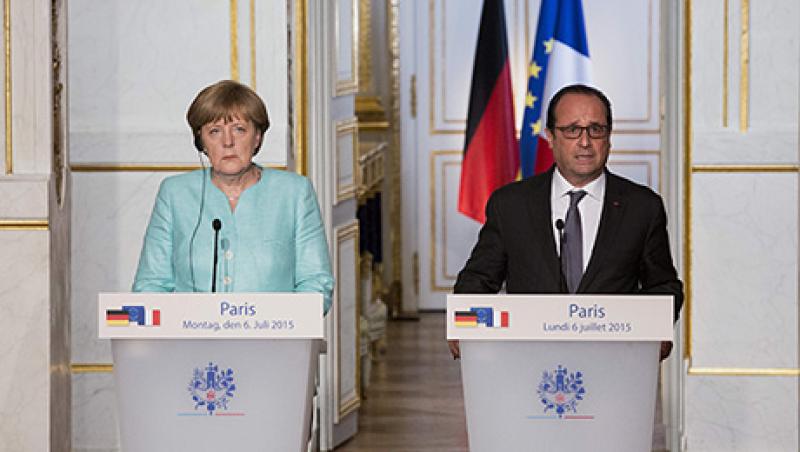Europeans struggled Monday to make sense of a Greek referendum that rejected the country’s onerous bailout conditions but did not ostensibly reject the euro.
Grexit now appears more likely than ever, although not a foregone conclusion. Angela Merkel does not want to go down in history as the German leader who presided over a Greek exit from the euro while Prime Minister Alexis Tsipras, with virtually the entire domestic political spectrum now behind him, may have more leeway to declare victory with any modifications he can win to his country’s €245 billion ($270 billion) bailout. Yet Greece is arguably the least of Europe’s worries. More important is whether the decisions taken in coming days and weeks strengthen the euro area’s institutions and economy — with or without Greek participation — or merely try to paper over the cracks in the single currency’s foundation.
“We have to find a new way” that would both strengthen the rules of the euro zone and promote growth rather than austerity, says Günther Schiendl, CIO of VBV-Pensionskasse, a €6 billion multiemployer pension fund in Vienna. That’s much easier said than done.
Arriving in Paris for a dinner meeting Monday with President François Hollande before a Eurogroup summit in Brussels on Tuesday, Chancellor Merkel called on Greece to take “responsibility” for reforming its economy while Hollande, more sympathetic to Athens, said it was important for a “balanced” solution involving both Greek reform and European “solidarity.”
The immediate downside risks are obvious. Athens has already defaulted on a €1.6 billion payment due last week to the International Monetary Fund. With Greece’s bank closure extending into a second week, the economy is suffocating. Unless some kind of agreement can be struck to enable Athens to make a €3.5 billion payment to the European Central Bank on July 20, the ECB will almost certainly have to suspend or terminate its liquidity assistance, bringing down the Greek banking system. The central bank raised the haircut on the collateral Greek banks have to post in exchange for liquidity on Monday by an unspecified amount, and reports from Athens suggest the country could run out of euro banknotes in a matter of days.
Sorting out these issues would be hard enough in normal times, but the hardball negotiating tactics of Tsipras and his government’s failure to engage on structural reform issues have eroded his credibility with EU leaders. Replacing the controversial and flamboyant Finance Minister Yanis Varoufakis, who accused the country’s EU creditors of “terrorism” on the eve of the referendum, only begins to repair the damage.
“The referendum result was a surprise to everyone,” says Steven Englander, head of G10 currency strategy at Citigroup. He puts the odds of a Greek exit at “not quite 50 percent, but rising.” Others are more pessimistic, with economists at Barclays declaring Grexit “a more likely scenario.” Michael Heise, chief economist at German insurer Allianz, is even more emphatic: “There is a large likelihood that there will be a Grexit,” he says.
“The political problem for the euro area’s statesmen and women is that a gift of the magnitude that Greek voters want to give themselves is the permanent destruction of any credibility for the euro area’s economic governance system,” writes Graham Bishop, an independent economist and frequent adviser to the European Commission on euro-related issues. “Greek voters may not have realized what they were demanding — it is far too high a price for the euro area to pay.”
What passes for optimism comes from Eric Chaney, chief economist at France’s AXA Group. He contends that the sheer margin of the Greek vote, which saw 61.3 percent of voters reject the European Union’s previous bailout offer, changes the calculus of EU leaders worried about the level of popular support for the euro and the bloc’s economic policies. “They have to do something, and it has to be not on the [economic] program but on debt relief,” Chaney says. The IMF pointed the way to a possible solution in a paper last week that called for a dramatic extension of maturities, and possible haircuts to official creditors, to make Greece’s debt sustainable. “If [Tsipras] gets something on debt relief, he will claim victory,” adds Chaney.
It would take months to negotiate a detailed agreement with binding reform commitments from Athens; the EU would have to provide substantial bridge financing in the meantime. That’s a tall order, and explains why AXA Investment Managers, the group’s €623 billion fund management arm, isn’t betting on a deal just yet. “We are really prepared for both” a compromise solution or Grexit, Chaney explains.
Not surprisingly, Tuesday’s Eurogroup summit will focus as much on containing the risks of contagion from a Greek exit as on trying to find a compromise with Tsipras. Spain’s left-wing party Podemos hailed the referendum result as a blow against EU austerity policies, while France’s Marine Le Pen of the far right National Front said the Greeks had signaled the death knell of the euro itself.
As a result, EU leaders are likely to embrace the other 18 members of the euro zone all the more tightly with fresh pledges of euro area solidarity and strong hints of ECB action to keep a lid on interest-rate spreads. “The ECB is the one institution that shows that sticking with a program is worthwile,” says Steven Englander, head of G10 currency strategy at Citigroup. The central bank can keep interest rates at low levels — particularly in peripheral countries such as Italy, Portugal and Spain — to prevent contagion within the euro area. The message, to policymakers and citizens alike, would be clear: You’d rather be in Portugal or Spain than in Greece. “The argument can be made that the European approach is working,” Englander says.
Working perhaps, but far from ideal. Yes, Spain has embraced austerity policies and structural reform, and the economy is forecast to grow by more than 2 percent this year, but unemployment hovers around 25 percent and popular discontent with the government’s policies remains high. Growth is weaker in Portugal, not to mention in France and Italy.
Meanwhile, the euro area continues to lack some basic features for resolving economic tensions between its members. Current policy effectively requires all members to generate current account surpluses rather than deficits, since red ink can quickly put a country in trouble. The Greek crisis has also put a halt to any serious discussions about moves toward fiscal union or even a modest increase in the communal EU budget, which would give some relief to countries undergoing recession in the way that the U.S. tax code silently shifts resources to states in recession. Proposals for such reforms were widespread just two years ago, but the bad taste left by the Greek crisis has left most national leaders unwilling to consider deeper integration.
When EU leaders created the euro in 1999, they declared the single currency to be irreversible. If they eject one member only 16 years later, they can’t pretend that it’s all the fault of Greece and avoid a deeper overhaul of the bloc’s policy arrangements without casting doubt on the euro’s long-term viability.
As one senior European banker puts it, “What if, in 18 months time, we have set a precedent for exit, and somebody else gets in trouble?”
That’s the ultimate question that EU leaders need to answer.
Visit Tom Buerkle’s blog and follow him on Twitter at @tombuerkle.






